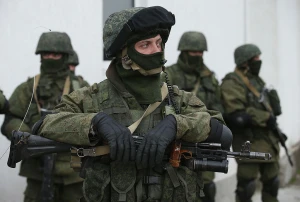
I brought deported Ukrainian children to speak at UN and it changed the world
Three children from Mariupol, who were returned from Russian deportation, spoke at the UN headquarters. Seeing the grief of war in the real stories of these children and changing the views of American politicians, who are far removed from the daily tragic events in Ukraine, was one of the key objectives of our trip to the United States. The stories of these children emphasize the urgent need for increased international pressure on Russia and tangible steps to return thousands of deported children to Ukraine
Stolen carefree childhood, stolen voices. These are Ukrainian children who have become victims of tyranny and Russian propaganda.
Sasha, Illya, and Kira are ordinary children at first glance, but very special when you start talking to them. They are from Mariupol and have seen the war in all its horror. The Russian aggression has taken away not only their childhood, it has deprived them of everything: parents, friends, and themselves, at least as they were before February 24. Their eyes are not childlike. They have lost everything, but the world admires their courage. They have taken on the responsibility to bear witness to deportation, but they also continue to live and learn to be happy again.
I first met them at a train station in Poland. We were all going to the United States together to tell their real stories to the highest levels of government. First of all, I was struck by the smiles of these three. The children were determined to reach the hearts of Americans so that they could hear what was really happening in Ukraine.
The two-day trip to the United States looked more like an adventure for them. The children were interested in everything. But the main thing for all of us was that the political establishment and ordinary Americans should hear the stories of these children and take more active action. Sasha, Illya and Kira were extremely lucky, if I may say so myself, because they are among the nearly four hundred children who were returned from Russia, where they were forcibly taken by the occupiers.
The photo was taken in the U.S. Congress. The photo shows three Ukrainian children from Mairupol. They told their stories in the U.S. Congress and the UN. Behind them is our advocate Khrystyna Shkudor and the grandfather of one of the boys.

The photo was taken in the U.S. Congress.
The photo shows three Ukrainian children from Mariupol. They told their stories in the U.S. Congress and the United Nations. Behind them is our advocate Khrystyna Shkudor and the grandfather of one of the boys
Photo: provided by Khrystyna Shkudor
International organizations have neither the influence nor the desire to find and return Ukrainian children abducted by Russians. Numerous documented crimes show that Russia continues to forcibly deport minors, many of whom belong to socially vulnerable groups, such as orphans, those deprived of parental care, and those who lost their parents or guardians during the fighting. According to the researchers of the Where Are Our People? advocacy campaign, Russians are actively "re-educating" and militarizing these children in detention centers. These actions by Russia are genocidal in nature.
Russians are actively conducting ideological work with children who are under occupation or deported. The Kremlin uses propaganda in the education system to justify a full-scale war against Ukraine. They create special camps for allegedly "adaptation and assistance in dealing with post-traumatic stress disorder" and involve minors in paramilitary Russian youth organizations such as Yunarmiya, Vagnerenok and Vympel, where they are turned into "toy soldiers" of the Kremlin. Thus, children who suffered from the occupation of Donetsk and Luhansk regions in 2014 are now fighting against Ukraine.
Russia has no safeguards or taboos in this war. And this can best be seen in the stories of Sasha, Illya and Kira. Their stories reveal the entire policy of the aggressor. Immediately after these children fell into the hands of the Russian occupiers, they were brainwashed with the phrases "Ukraine no longer exists", "your relatives abandoned you", "now you will go to Russia and have a new life and a new family there.”
The list of such clichés of Russian propaganda is endless. Sasha, Illya and Kira, as I said, are lucky: their relatives fought for them and managed to bring them back home. Now they are all starting to live together in new cities, conditions and reality where they lost everything.
One of the primary aims of this trip was to showcase the grief of war through the personal stories of these children, with the goal of influencing the perspectives of American politicians, who are distant from Ukraine's daily tragedies. The inaugural event took place at the UN, drawing diplomats from across the globe who came to listen to the children's narratives. As a result, the voices of Ukrainian deported children resonated for the first time in the heart of New York City, within the halls of the UN headquarters.
Their bravery in recounting the horrors of their abduction moved many to tears, including interpreters and diplomats from different countries. The stories of these children are a demand for the urgent need for international pressure on Russia and concrete steps to return the deported minors to Ukraine. However, a general repatriation is currently impossible until Ukraine's complete victory on the battlefield and the UN takes effective steps in the legal field.
After the trip, the United States officially joined the International Coalition to Return Deported Children. Then the House of Representatives passed a resolution condemning the abduction of Ukrainian children. This is a huge step forward and a victory. Even if it is belated.
Together with my colleagues and partners, I have created a petition to the United Nations calling on Russia to return all abducted Ukrainian children. In order for the United Nations to take it into consideration, we need to collect 100,000 signatures. This is a chance for each of us to help. The collection lasts until June 1, International Children's Day.
Whether the resolution will help the international community and diplomacy to return the abducted children as soon as possible is another rhetorical question. If we don't want the horrors experienced by Sasha, Illya and Kira to continue and scale up, this is one of the legal ways to put pressure on Russia and force it to respond. Currently, Russian authorities remain silent, ignoring the issue of abducted Ukrainians. Yet, history has demonstrated time and again that circumstances can shift; the pivotal step is to make decisions, persevere, and take action.
Exclusively for Espreso
About the author. Khrystyna Shkudor, advocacy manager of the Where Are Our People? campaign at PR Army.
The editors do not always share the opinions expressed by the blog authors.
- News














































